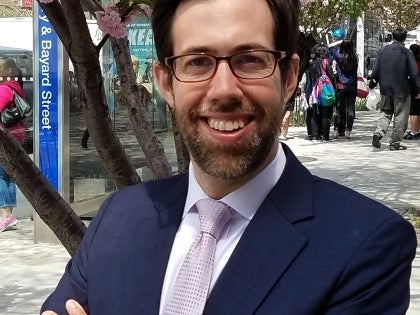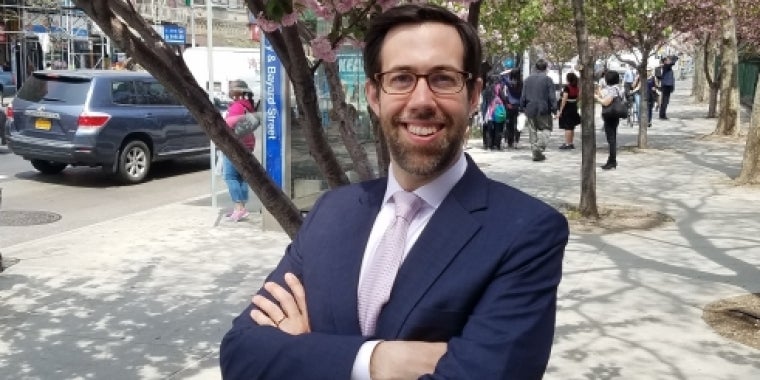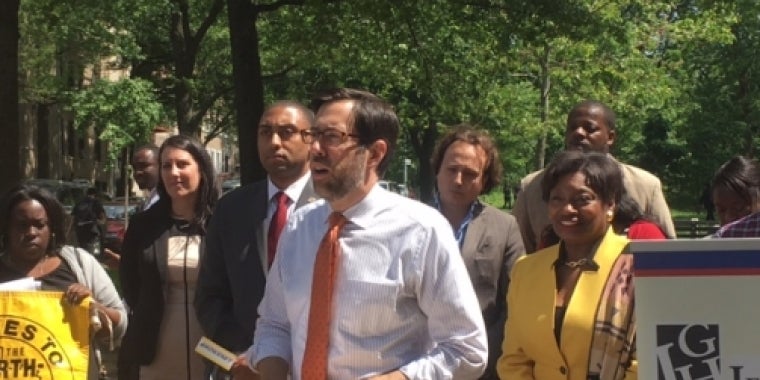
Downtown Express: Stopping puddles before they become ponds
By Aline Reynolds
This year’s heavy rains have led to considerable flooding throughout the Tri-state area and have exacerbated the longstanding problem of “ponding” in Chinatown. The rains also caused State Senator Daniel Squadron to commission a report identifying close to 100 Chinatown “ponds,” or standing bodies of storm-water run-off, that hadn’t drained within 48 hours of the initial rainfall.
Squadron’s team conducted a survey this summer after receiving numerous complaints from community members about the dirty, road-damaging puddles. Water accumulation leads to cracks, potholes and depressions in the streets’ concrete and asphalt that can spread throughout blocks if left unattended, according to the Senator’s report.“The point is real and serious: ponding is the beginning of serious road conditions,” said Squadron at a Sept. 23 press conference at Columbus Park. “In and of itself, it’s a hazard and a blight to the community, and we should do something about it.”
Apart from damaging the streets, the ponds, which are often contaminated with trash and liquids, become breeding grounds for insects. Chris Kui, executive director of Asian Americans for Equality, said the puddles are a health hazard.
“I think it’s more than just [about] attracting tourists in the community… it’s really a quality of life issue for residents,” said Kui. “We can see an increase of mosquitos and flies all over… it’s just not something that’s beneficial to our community at all.”
Squadron’s team detected the greatest concentrations of ponding on Bayard Street between Bowery and Baxter Street; Mulberry between Worth and Canal Streets; Mott between Worth and Hester Streets; Baxter between Leonard and Canal Streets; and Elizabeth between Bayard and Hester Streets. Eleven additional ponds were found along Market Slip between East Broadway and Monroe Street.
A recent study conducted by the Chinatown Partnership Local Development Corporation identified 177 instances of ponding and showed significant overlap with Squadron’s study.
According to Squadron’s survey of nearly 350 Chinatown residents, business owners, workers and visitors, 94 percent said they have observed instances of ponding. Seventy-two percent of the respondents said that ponding negatively impacts their eating or shopping experience in Chinatown and 40 percent of respondents said they would be less likely to visit the neighborhood because of the standing water.
More than two-thirds of respondents said the city’s response to ponding is “poor” or “below average.” Seventy-seven percent of respondents said they didn’t report ponding when they observed it and 58 percent of respondents claimed not to know how to report the issue. Heeding the responses, Squadron reached out to the NYC Department of Transportation to establish a better 3-1-1 protocol for processing ponding calls so that the agencies could more effectively record the complaints and track the status of street repairs.
“The D.O.T. has to do a better job coordinating with 3-1-1 to fix these problems,” Squadron said.
A spokesperson for the D.O.T. said the city allocated an additional $2 million to this year’s original $190.4 million budget for paving and pothole repair operations on city streets due to severe weather conditions. Squadron argues, however, that the city should take preventative measures to keep the puddles from forming to begin with.
“They should take some of those dollars [allocated to] road conditions to deal with the ponds before they become serious problems,” said Squadron.
Numerous community members who attended the press conference attested to the pervasiveness of ponding, including Susan Stetzer, district manager of Community Board 3. This year, Stetzer said, ponding in Chinatown has worsened to the point that it has become unmanageable.
“We’ve all seen how ponding can make sidewalks inaccessible,” said Stetzer. “People can’t get where they’re going and businesses lose customers.”
“Our seniors slip and fall as they walk through the uneven pavement and the ponds, and people who come from oversees think that it’s such a messy place,” said Virginia Kee, founder of the Chinese-American Planning Council, a grassroots community advocacy organization. “It doesn’t have to be [that way].”
Some of the puddles are caused by faulty water mains, according to William Su, president of the Myanmar-Chinese Association of New York. “We need to get this place cleaned up so we can live in a better Chinatown,” he said.
Ponding forms with or without rainfall, echoed Councilmember Margaret Chin, and they are as dangerous as they are smelly.
“People have to walk around them to cross the street,” said Chin. “In order to make [Chinatown] brighter, cleaner and ready to attract more tourism… we have to deal with this problem.”



